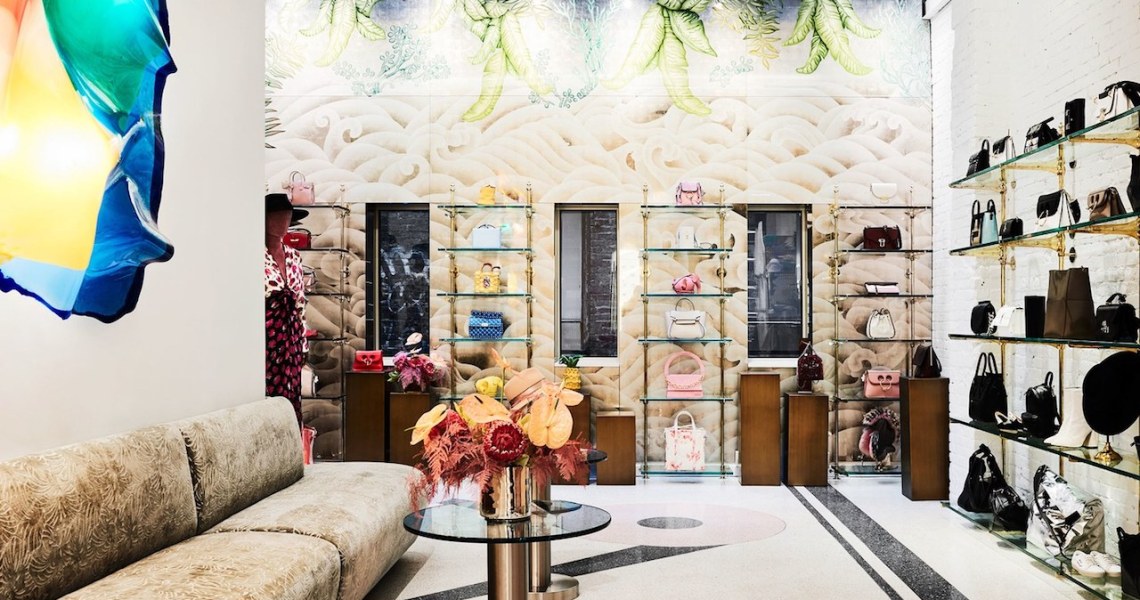Onia opened its Madison Avenue flagship on March 12, the same day New York City declared a state of emergency in response to coronavirus.
Rather than let this inauspicious start derail its season, however, the swim and lifestyle brand doubled down on its online efforts and last month launched same-day delivery for Manhattan customers. While its new store remains closed as of late June, it now operates as a mini-distribution center from which terry-cloth polos and bandeau bikinis can be whisked off to local shoppers in a matter of hours.
“Same-day delivery has always been a vision of ours, because our customers are very last-minute,” said Nathan Romano, Onia’s co-founder. “They’re like, ‘Oh, I’m going to the Hamptons today. I need it today.’”
That speed was impossible to achieve with traditional shipping options: Fedex has been plagued with widespread delays during the pandemic, and Onia’s New Jersey warehouse has been operating at reduced capacity to comply with Centers for Disease Control and Prevention guidelines.
Instead, the brand partnered with Bond, a last-mile logistics startup that uses a network of local “nano-distribution centers” and a fleet of couriers on electric tricycles, offering customers the ability to schedule and track their deliveries, Uber Eats-style. Through Onia, the service costs $25 and is currently available in Manhattan only, though expansion plans are underway for the coming months.
Bond also handles same-day and next-day returns and exchanges — a service Onia plans to roll out soon — allowing customers to trade-in for a new size or style on demand. This brick-and-mortar-like immediacy benefits brands, too, reducing the lag time between returns and restocking, so items have more time on the shelf to (hopefully) be sold at full price.
Rather than measuring the success of its couriers on the number of drop-offs they make, Bond measures customer happiness, or “happy deliveries,” said Dan Eblagon, the company’s co-founder and chief marketing officer.
“Our job is not only to move packages from A to B. It’s to move packages from A to B in the name of the brand,” he said. “Our work is to extend the brand experience, so we put a lot of focus on that point.”
Finding a way to elevate every step of the e-commerce process has become a more pressing concern than ever for fashion brands and retailers as they navigate ongoing store closures and a massive shift to online retail. In April and May, U.S. consumers spent $153 billion online, according to Adobe — $52 billion more than expected during the period. And even as states across the country reopen their economies, a Deloitte survey conducted in mid-June found that only about half of American consumers feel safe going to stores.
For luxury brands, the in-store experience is usually a crucial part of the value proposition: Customers expect personalized attention, seamless try-ons, and services like tailoring and styling.
Top clients have long been able to receive this kind of exclusive treatment in their homes, but now, some high-end retailers are working to extend it to all customers, regardless of whether they’re spending $1,000 or $100,000.
At the forefront of this push is Sojin Lee, an e-commerce and luxury veteran who helped launch Net-a-Porter following stints at Chanel and Bottega Veneta. Lee is founder and CEO of Toshi, a fashion tech startup that provides concierge services for brands including Roland Mouret, Chanel eyewear, Erdem and Galvan London.
After launching in London and spending three years developing and beta testing the technology, Toshi expanded to New York City in November through a partnership with multi-brand retailer The Webster. Customers in Manhattan and Brooklyn can choose Toshi at checkout when they place an order online — or in-store, once the Soho location reopens. A stylist will bring their purchases to their door, along with size options, a kit for alterations and a selection of additional pieces (say, a pair of shoes to go with the dress they ordered), if requested.
During the past two months of the pandemic, Lee said orders have skyrocketed, and customers have grown increasingly engaged: More than 60% of orders now including services like “Wait & Try” and “Size Up/Size Down” rather than simple on-demand drop-offs.
Shoppers, she said, often want a sounding board, which Toshi’s “experience assistants” — often retail workers, fashion students or stylists — provide. Despite the years spent honing the company’s delivery algorithm, which matches each order with a stylist, “I think the human value empowered by the technology is where our sector will shine the most,” she said.
While the coronavirus crisis has delayed its rollout plans, the company plans to eventually launch operations in luxury capitals like Los Angeles, Paris, Beijing and Shanghai, said Lee.
The service is free for customers. Brands and retailers pay to integrate Toshi, and so far, Lee said the results have proven its worth: Its partners have seen a 40% increase in average order value, a 30% increase in revenue and a 30% reduction in returns with the use of its services.
As Lee said, if a luxury brand says, “‘Oh, please come to the store and then let me give you a glass of champagne.’ They’re not going to charge the champagne in that instance. A lot of our brands really believe that this is something that they should be offering for free as an extension of that service.”




